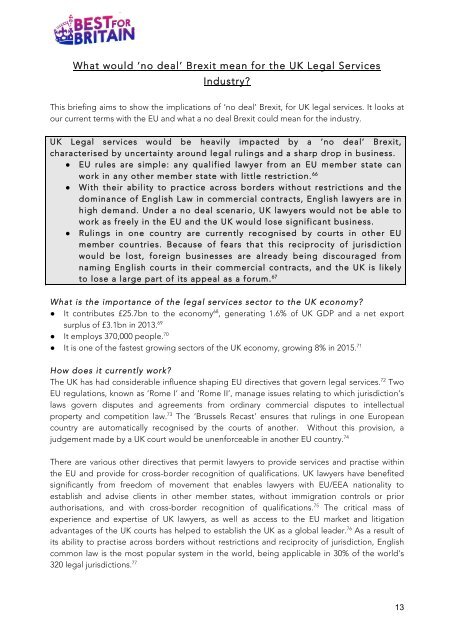Best for Britain Brexit-Reports-6.12.17-FINAL
Create successful ePaper yourself
Turn your PDF publications into a flip-book with our unique Google optimized e-Paper software.
What would ‘no deal’ <strong>Brexit</strong> mean <strong>for</strong> the UK Legal Services<br />
Industry?<br />
This briefing aims to show the implications of ‘no deal’ <strong>Brexit</strong>, <strong>for</strong> UK legal services. It looks at<br />
our current terms with the EU and what a no deal <strong>Brexit</strong> could mean <strong>for</strong> the industry.<br />
UK Legal services would be heavily impacted by a ‘no deal’ <strong>Brexit</strong>,<br />
characterised by uncertainty around legal rulings and a sharp drop in business.<br />
● EU rules are simple: any qualified lawyer from an EU member state can<br />
work in any other member state with little restriction. 66<br />
● With their ability to practice across borders without restrictions and the<br />
dominance of English Law in commercial contracts, English lawyers are in<br />
high demand. Under a no deal scenario, UK lawyers would not be able to<br />
work as freely in the EU and the UK would lose significant business.<br />
● Rulings in one country are currently recognised by courts in other EU<br />
member countries. Because of fears that this reciprocity of jurisdiction<br />
would be lost, <strong>for</strong>eign businesses are already being discouraged from<br />
naming English courts in their commercial contracts, and the UK is likely<br />
to lose a large part of its appeal as a <strong>for</strong>um. 67<br />
What is the importance of the legal services sector to the UK economy?<br />
● It contributes £25.7bn to the economy 68 , generating 1.6% of UK GDP and a net export<br />
surplus of £3.1bn in 2013. 69<br />
● It employs 370,000 people. 70<br />
● It is one of the fastest growing sectors of the UK economy, growing 8% in 2015. 71<br />
How does it currently work?<br />
The UK has had considerable influence shaping EU directives that govern legal services. 72 Two<br />
EU regulations, known as ‘Rome I’ and ‘Rome II’, manage issues relating to which jurisdiction’s<br />
laws govern disputes and agreements from ordinary commercial disputes to intellectual<br />
property and competition law. 73 The ‘Brussels Recast’ ensures that rulings in one European<br />
country are automatically recognised by the courts of another. Without this provision, a<br />
judgement made by a UK court would be unen<strong>for</strong>ceable in another EU country. 74<br />
There are various other directives that permit lawyers to provide services and practise within<br />
the EU and provide <strong>for</strong> cross-border recognition of qualifications. UK lawyers have benefited<br />
significantly from freedom of movement that enables lawyers with EU/EEA nationality to<br />
establish and advise clients in other member states, without immigration controls or prior<br />
authorisations, and with cross-border recognition of qualifications. 75 The critical mass of<br />
experience and expertise of UK lawyers, as well as access to the EU market and litigation<br />
advantages of the UK courts has helped to establish the UK as a global leader. 76 As a result of<br />
its ability to practise across borders without restrictions and reciprocity of jurisdiction, English<br />
common law is the most popular system in the world, being applicable in 30% of the world’s<br />
320 legal jurisdictions. 77<br />
13
















